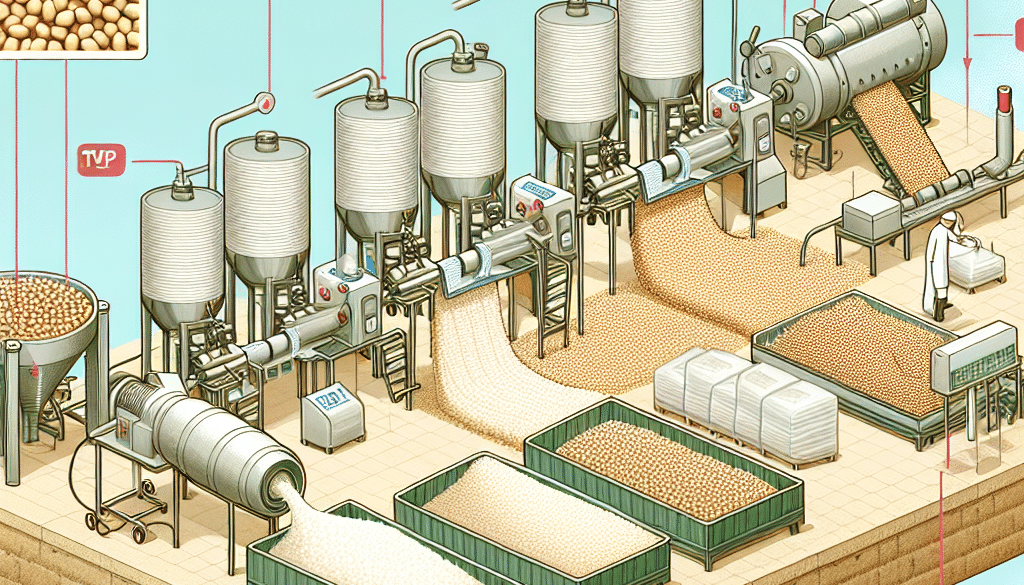Is Textured Vegetable Protein A Highly Processed Food?
-
Table of Contents
- Textured Vegetable Protein: A Closer Look at Its Processing Level
- Understanding Textured Vegetable Protein
- The Processing Spectrum of Foods
- Is TVP Highly Processed?
- Nutritional Profile of TVP
- Case Studies and Examples
- Consumer Considerations
- Conclusion: Balancing Benefits and Processing Concerns
- Discover ETprotein’s High-Quality Protein Products
Textured Vegetable Protein: A Closer Look at Its Processing Level

Textured Vegetable Protein (TVP), also known as textured soy protein (TSP), is a versatile food ingredient derived from soybeans. It has become increasingly popular as a plant-based alternative to meat, especially among vegetarians and vegans. However, there is an ongoing debate about whether TVP can be considered a highly processed food. This article delves into the production process of TVP, its nutritional profile, and its place in a healthy diet, providing a comprehensive understanding of this food product.
Understanding Textured Vegetable Protein
Before we can determine the processing level of TVP, it’s essential to understand what it is and how it’s made. Textured Vegetable Protein is made from defatted soy flour, a by-product of soybean oil extraction. The process involves several steps:
- Cleaning and dehulling the soybeans.
- Crushing the beans to extract the oil.
- Using the remaining soy flour and treating it with heat and pressure.
- Extruding the flour into various shapes and textures.
- Drying the extruded shapes to create the final TVP product.
This process results in a product that is high in protein and fiber while being low in fat. TVP is also known for its ability to absorb flavors and mimic the texture of meat, making it a popular meat substitute in various dishes.
The Processing Spectrum of Foods
To assess whether TVP is a highly processed food, it’s important to understand the spectrum of food processing. The NOVA classification system categorizes foods into four groups:
- Unprocessed or minimally processed foods.
- Processed culinary ingredients.
- Processed foods.
- Ultra-processed food and drink products.
Unprocessed foods are whole foods in their natural state, while ultra-processed foods are those that have been significantly altered from their original form and often contain additives such as colors, flavors, and preservatives.
Is TVP Highly Processed?
Given the production process of TVP, it falls under the category of processed foods. It is not an ultra-processed food since it does not typically contain a long list of additives; however, it does undergo significant transformation from its original state as a soybean to become the final product that consumers purchase.
The extrusion process, which gives TVP its texture, is a high-heat and high-pressure method that some may argue strips away some of the natural qualities of the soybeans. However, this process is also what allows TVP to be a versatile and protein-rich food source.
Nutritional Profile of TVP
When evaluating the health implications of consuming TVP, it’s crucial to consider its nutritional content. TVP is:
- Rich in protein, comparable to that of meat.
- Low in fat and contains no cholesterol.
- A good source of fiber.
- Often fortified with vitamins and minerals, such as iron and B vitamins.
These attributes make TVP an attractive option for those looking to increase their protein intake without the saturated fat and cholesterol found in animal products.
Case Studies and Examples
Several studies have examined the health impacts of consuming TVP. For instance, research has shown that incorporating soy protein into one’s diet can help lower cholesterol levels and may reduce the risk of heart disease. Additionally, TVP’s high fiber content can aid in digestion and promote satiety, which can be beneficial for weight management.
Examples of TVP in the market include meatless burger patties, vegetarian chili, and vegan ground beef substitutes. These products showcase TVP’s ability to adapt to various recipes and culinary needs.
Consumer Considerations
When choosing to include TVP in a diet, consumers should consider the following:
- The source of the soybeans (e.g., non-GMO, organic).
- The presence of any additional ingredients or additives.
- The overall balance of their diet and variety of protein sources.
It’s also worth noting that individuals with soy allergies or sensitivities should avoid TVP.
Conclusion: Balancing Benefits and Processing Concerns
In conclusion, while TVP is a processed food, it is not considered highly processed compared to many other food products on the market. Its nutritional benefits, particularly for those seeking plant-based protein sources, can make it a valuable addition to a balanced diet. However, as with any processed food, it should be consumed in moderation and as part of a diet that includes a variety of whole foods.
The key takeaways from this article are:
- TVP is made from defatted soy flour and undergoes a process of extrusion.
- It is classified as a processed food but not an ultra-processed one.
- TVP is high in protein and fiber, low in fat, and often fortified with vitamins and minerals.
- Consumers should consider the source of the soy and any additional ingredients in TVP products.
Discover ETprotein’s High-Quality Protein Products
If you’re interested in exploring high-quality protein options, ETprotein offers a range of organic bulk vegan proteins that cater to various dietary needs and preferences. Their products, including Organic rice protein, clear rice protein, pea protein, and more, are characterized by a neutral taste, non-GMO, and allergen-free attributes. With a commitment to purity and quality, ETprotein is a trusted supplier for industries across the globe.
About ETprotein:
ETprotein, a reputable protein and L-(+)-Ergothioneine (EGT) Chinese factory manufacturer and supplier, is renowned for producing, stocking, exporting, and delivering the highest quality organic bulk vegan proteins and L-(+)-Ergothioneine. They include Organic rice protein, clear rice protein, pea protein, clear pea protein, watermelon seed protein, pumpkin seed protein, sunflower seed protein, mung bean protein, peanut protein, and L-(+)-Ergothioneine EGT Pharmaceutical grade, L-(+)-Ergothioneine EGT food grade, L-(+)-Ergothioneine EGT cosmetic grade, L-(+)-Ergothioneine EGT reference grade and L-(+)-Ergothioneine EGT standard. Their offerings, characterized by a neutral taste, non-GMO, allergen-free attributes, with L-(+)-Ergothioneine purity over 98%, 99%, cater to a diverse range of industries. They serve nutraceutical, pharmaceutical, cosmeceutical, veterinary, as well as food and beverage finished product distributors, traders, and manufacturers across Europe, USA, Canada, Australia, Thailand, Japan, Korea, Brazil, and Chile, among others.
ETprotein specialization includes exporting and delivering tailor-made protein powder and finished nutritional supplements. Their extensive product range covers sectors like Food and Beverage, Sports Nutrition, Weight Management, Dietary Supplements, Health and Wellness Products, and Infant Formula, ensuring comprehensive solutions to meet all your protein needs.
As a trusted company by leading global food and beverage brands and Fortune 500 companies, ETprotein reinforces China’s reputation in the global arena. For more information or to sample their products, please contact them and email sales(at)ETprotein.com today.












